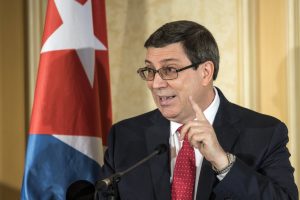Vienna, Jun 19 (EFE).- Cuban Foreign Minister Bruno Rodriguez on Monday ripped US President Donald Trump for hardening Washington’s policy toward the island.
“These unpopular measures ignore the majority’s support for the lifting of the blockade and the normalization of relations between Cuba and the United States by Congress people, including many members of the Republican Party, the business sector, several civil society organizations, Cuban migration, the press, social media and US public opinion,” Rodriguez said in a press conference in Vienna that marked the first public response by a Cuban official to the US leader’s actions.

On Friday, Trump revoked predecessor Barack Obama’s executive orders loosening restrictions on travel and investment in Cuba.
“I am canceling the last administration’s completely one-sided deal with Cuba,” Trump told a largely Cuban-American audience in Miami, vowing to “seek a much better deal for the Cuban people and for the United States of America.”
Rodriguez said the policy change was counterproductive for a bilateral relationship that had started to improve.
“As proved by the achievements made over the past two years, Cuba and the United States can cooperate and co-exist in a civilized way, respecting the deep differences between their governments and promoting everything that benefits both nations and peoples,” Rodriguez said.
The Cuban foreign minister said Trump’s policy change would be harmful to many groups on the island.
The measures “will affect families and will cause economic damage, not only to state companies but also to cooperatives and self-employed or private workers. They will also damage Cuban migration,” Rodriguez said.
The Cuban official said Havana would not make any concessions to Washington to save the opening in relations engineered by Obama in December 2014.
“Cuba will not make concessions regarding its sovereignty and independence, it will not negotiate its principles nor will it accept conditions, as it has never done along the history of the revolution,” Rodriguez said.
The foreign minister said Havana would not hand over any of the individuals wanted for committing crimes in the US who are living in Cuba under government protection, a demand made by Trump.
In December 2014, the US and Cuba announced the start of a process of normalizing relations that resulted in the upgrading of their respective interests sections to embassies in July 2015.
While Trump did not break diplomatic relations with Cuba, he ordered a roll back of several changes made by Obama.
The White House said the new policy would channel economic activities away from the “Cuban military monopoly,” the Armed Forces Business Enterprises Group, and “makes clear that the primary obstacle to the Cuban people’s prosperity and economic freedom is the Cuban military’s practice of controlling virtually every profitable sector of the economy.”
The new US policy bans the “self-directed, individual travel permitted by the Obama administration” but will allow Cuban-Americans to continue to visit their family members in the Caribbean nation and send them remittances.
The policy also reaffirms the 55-year-old US economic embargo on Cuba, which only Congress can lift.
Trump ordered the US Treasury and Commerce Departments to begin the process of issuing new regulations within 30 days, but the process of finalizing the new regulations could take several months.
